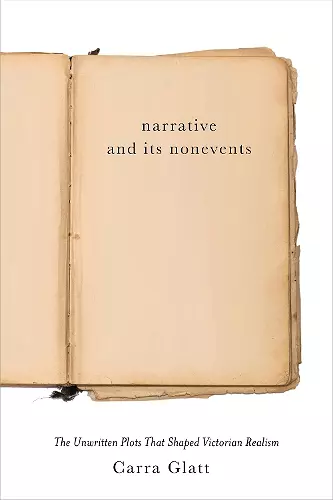Narrative and Its Nonevents
The Unwritten Plots That Shaped Victorian Realism
Format:Paperback
Publisher:University of Virginia Press
Published:30th Dec '22
Currently unavailable, and unfortunately no date known when it will be back

This book is about what does not happen in the Victorian novel. The description may sound absurd, yet consideration of alternatives to a given state of affairs is crucial to our understanding of a novel. Plot emerges out of the gradual elimination of possibilities, from the revelation, on the first page of a work, that we are in nineteenth-century London and not sixteenth-century Paris, to the final disclosure that Pip returns home too late to marry Biddy but is now free to pursue his lost love Estella.
Through careful examination of the plots of such classics as Charles Dickens’s Great Expectations, Charlotte Brontë’s Villette, Wilkie Collins’s The Moonstone, Jane Austen’s Pride and Prejudice, Henry James’s The Ambassadors, Elizabeth Gaskell’s Mary Barton, and others, Glatt argues for the central role of these "unwritten plots" in Victorian narrative construction. Abandoning the allegorical mode—in which characters are bound by fixed identities to reach a predetermined conclusion—and turning away from classical and historical plots with outcomes already known to audiences, the realist novel of the Victorian era was designed to simulate the openness and uncertainty of ordinary human experience. We are invested in these stories of David Copperfield or Elizabeth Bennet or Lucy Snowe in part because we cannot be entirely sure how those stories will end. As Glatt demonstrates, the Victorian novel is characterized by a proliferation of possibilities.
"Counterfactuals have been of increasing interest to literary critics, and Narrative and Its Nonevents will thicken and enrich the conversation about them. Timely and lucidly phrased and organized, this book is also witty—occasionally it made me laugh out loud. Most important, it shows that Glatt is an acute critic, with a narratological argument that leads to fresh commentary on classic texts. In stylish prose, this book makes substantial theoretical and critical contributions to its field."
- Andrew H. Miller, Johns Hopkins University, author of The Burdens of Perfection: On Ethics and Reading in Nineteenth-Century British Literature
ISBN: 9780813948867
Dimensions: unknown
Weight: 363g
232 pages